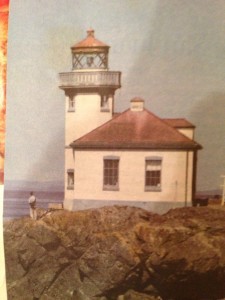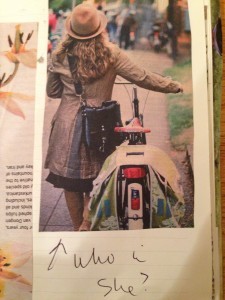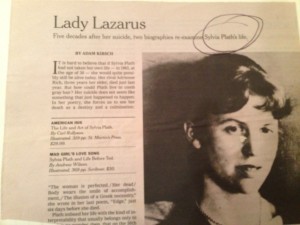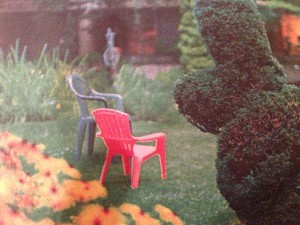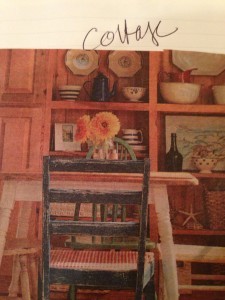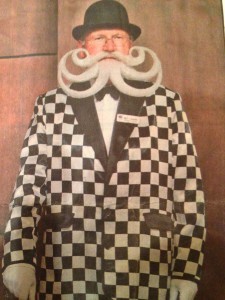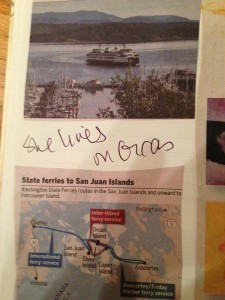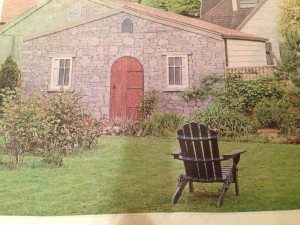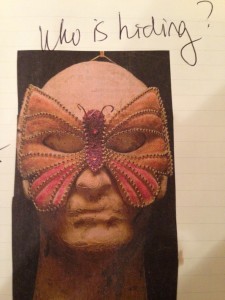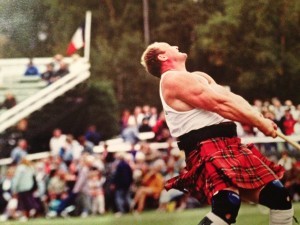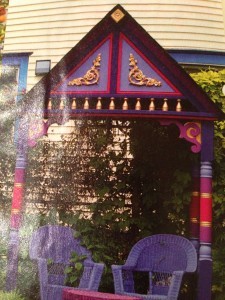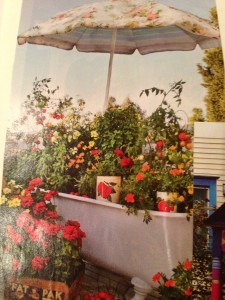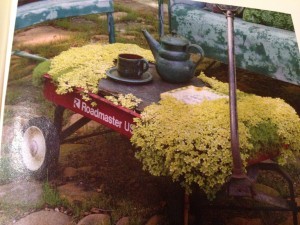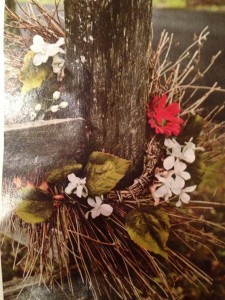Cathy Lamb's Blog, page 46
May 31, 2016
My Mother Kept Our TV In The Closet Like A Wretched Family Secret
My childhood was a little bit quirky.
One of the quirky things about it was my sweet mother’s utter distaste for TV.
Bette Jean kept our black and white TV in the closet. Yes, in the closet. As if the TV was a wretched family secret that had to be locked away.
Our TV was as heavy as a crate of steel and as wide as a Mack truck. It was a looming black and gray blob. The unwieldy antennae looked like it came off a space ship. It had to be adjusted, stabilized, propped up. The picture was none too clear, often fuzzy.
The Blob had a handle on top and had to be heaved out of the closet and up onto a bench in the family room so we could watch it. You could darn near throw your back out hauling that TV in and out, but our inevitable broken backs and whining did not prevent my mother from insisting that we haul it right back into the closet the minute our show was over.

Bette Jean thought the TV was unsightly and she thought that the vast majority of TV shows were unsightly, too, and should not be watched. It rightly followed that she should not spend any hard earned money on a new TV and that TV should be somewhat difficult to view.
Now no one else’s mother thought this. Everyone else in the neighborhood had a color TV. Everyone else in the country probably had a colored TV. But not us. Oh, no. Many years after color TVs came out, we watched the ole’ black and white.
That TV was pretty embarrassing for a kid who really wanted to fit in but knew from a very early age she wasn’t quite going to.
Friends would say, “Where’s your TV, Cathy?” And I would, with great shame, open the door to the dark closet, as if I was letting out a roaring monster. Or the wretched family secret.
The only thing I could compare not having a colored TV to, at that time, is not having a refrigerator. In place of a refrigerator, you would have stacks of ice in your kitchen. Or, perhaps instead of an oven, you would have a cave in the kitchen that held hot rocks.
So what were we allowed to watch? Very few shows. One was The Waltons. For those of you too young to know, this was a show set on a farm in Virginia. It was about seven kids and their parents during the Great Depression. They prayed at dinner. We could also watch the Brady Bunch now and then. Bewitched.
Only good, clean, wholesome family shows.
We were also allowed to watch Saturday morning cartoons. I don’t think my mother liked us watching cartoons, (also unsightly) but she had four kids, she was wiped out, and the cartoons allowed her to sleep in a couple of hours one day a week.
Bette Jean could not sleep in on Sunday, God forbid, because she and my father had to cattle prod four kids out to Catholic mass, hail Mary full of grace, the Lord is with thee, do not let your children watch TV.
So why the aversion to television shows? That’s a pretty simple answer. My mother was an English teacher. She believed in books. Books were far superior to any show.
She also believed that children should play outside. So we headed out the door to play hide and seek and kick the can and had all sorts of fun, and when we headed back in we often dove into the world of books.
I think of her and that hulking TV in the closet sometimes when I’m watching a show. My favorites? Property Brothers. Fixer Upper. Madam Secretary. A couple of reality shows I’m really too embarrassed to admit that I watch. My TV is up in a cabinet. The screen has to be three times the size of The Blob.
I like my shows, but Bette Jean had it right.
There is a rare show that is better than a great book.
Playing outside is really fun.
I hope to do more reading and more playing outside this summer, and less TV.
I’m going to wish you the same. And let me know if you put your TV in the closet. Bette Jean would really like that.
*** This is a photo of my parents’ first house in Huntington Beach, California, about 1965. It’s where the anti – TV saga began before we moved to Oregon and The Blob found a new home in the closet.
May 25, 2016
Rex and Lucky Dog
What are the little things in life that bring you the most joy?
Can I tell you a little, tiny story, oh please?
Animals often make me laugh, especially this one. I am the aunt to this adorable dog, Rex. Full blown German Shepherd and damn proud of it. Here’s the funny thing: He has a favorite TV show. Every Saturday he watches a show called Lucky Dog. He LOVES it. He can barely contain himself and his excitement. It is a glorious day when Lucky Dog is on!

Sometimes he tries to scratch the TV screen so he, too, can play with the dogs on the show. He also runs around the back of the TV to FIND them, as if they’re hiding.
He reminds me, once again, that it’s the little things we love to do in life that bring the most joy. For me, it’s books, gardening, the beach. For Rex, it’s Lucky Dog.
What is it for you?
May 24, 2016
Welcome, Writer, To 10 Days Of Editing Hell
I love writing.
Usually.
But what you are looking at now is the first page of a stack of pages that makes my brain short circuit. It makes me think about holding a paper bag over my face and having an elephant sized anxiety attack.
It makes me wonder why I did not train to be a trapeze artist instead of being a writer. (True reasons I can’t do that job: I am way too heavy, not flexible, scared of heights, and don’t like flying through the air while spinning.)
These are page proofs.
That is their official name. “Page Proofs.”

The unofficial name is “Welcome, Writer, To 10 Days Of Editing Hell.”
This is the last chance for a writer to find and edit errors before the book goes to print.
This is chapter one, page one, of my next book The Language of Sisters, out in September.
Here are the things I’d rather do than edit page proofs.
Chase a jaguar.
Run from a jaguar
Learn how to get a rattlesnake to dance out of a basket
Dress like a ghost and parade around town while cackling.
Eat dandelions.
Dance around a pole in a bikini though I have given birth to three children.
By the time I get this intimidating stack of pages I have edited my book eleven times. Yes, eleven. It is obsessive, I know.
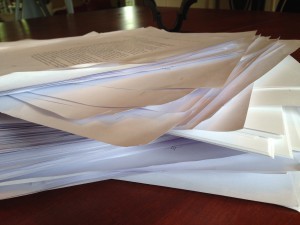
I don’t want to read it a twelfth time, bash me in the head, jangle my bones, slap me on the butt with a banana, I so don’t.
I edit about 50 of these pages a day. This should not be compared to reading, for fun and games and delight, a book. Especially a book that is so scary you go hide in a closet or a book so gripping you are out of your own head and in a different world.
No, this is 50 pages I have to read as if I am pulling a fine toothed comb through every word on the page while reciting, by memorization, every word in the dictionary and all American grammar rules.
I cannot miss a missing ‘to,’ in this manuscript.
I cannot miss a needed comma.
I cannot miss a comma that SHOULDN’T be there.
I cannot semi – sleep through a passage, especially when I realize to my UTTER HORROR that I have made a HUGE mistake in my story. (Hear me scream, beat my chest, say bad words!)
When I realize that I truly, utterly SCREWED UP, I have to write a pleading note to, in my case, Paula, my copy editor, who is a saint, and BEG her to make the change. I beg and beg and beg. I am pathetic.
And when I find ANOTHER ERROR and I realize I have SCREWED UP AGAIN, despite already editing the book eleven freakin’ times, the begging begins once more.
(Please, Paula, please. Whimper. Sob. Whine.)

It’s quite humbling.
One time I brought a dead girl back to life at the end of the book when I accidentally gave her something to say.
Another time I changed the race of a character from the beginning of the book to the end.
I have messed up names and locations.
Still another time I…well, let’s not talk about THAT error.
Everything must be perfect. Perfect is extremely difficult. Unattainable. But I try.
When the proofs are mailed back, there is a sense of relief.
The book is done.
I am done.
My eyes are fuzzy, my hair unwashed, and I have odd nervous ticks coming up here and there. I am sleepless, my insomnia a living devil in my bed, but the book is off and I can do no more.
On to the next story until the hellish page proofs arrive at my front door, giggling evilly at me in that really mean way only page proofs can do.
But I do hope you enjoy The Language of Sisters, I truly, really, totally do.
May 20, 2016
When Author Adria Cimino And I Sat Down For A Chat…
Thanks, Adria Cimino, wonderful author and publisher, who has the grand pleasure of living in PARIS, yes THAT Paris, for inviting me to chat with you today on your blog.
This is the link to the “real” interview. http://adriainparis.blogspot.fr/2016/...
Thursday, May 19, 2016
Interview: Cathy Lamb, author of MY VERY BEST FRIEND
Adria Cimino: As part of the launch of my latest novel, A Perfumer’s Secret, I’m interviewing the wonderful authors who took the time to read and endorse my book. Today, I’m chatting with Cathy Lamb, author of 10 (yes, you read that right — 10!) amazing novels. And her 11th is set for release later this year!
So let’s talk about her latest release, My Very Best Friend, a story of friendship, but also love in general, loyalty, forgiveness…
Cathy, there are so many themes from life in this novel! What inspired you to write this story, and to set it in Scotland?
I was inspired to write My Very Best Friend in Scotland because I wanted to fly across an ocean and see men in kilts.
Ha! No, the REAL reason I set the book in Scotland is because Rebel Dancing Daughter, our oldest, goes to college there and it gave me a splendid excuse to visit her. Plus, I love Scotland, the Highlands, the perfect, gentle peace of that country, the music and the food. Did I mention the food? I love the food.
Plus, readers love to travel in books and I thought my readers might like to travel with me.

Throughout the book, Charlotte remembers legends told by her father. They create such rich imagery and remain in the reader’s mind long after closing the book; Were these a product of your imagination, or are they legends/stories you had heard or found in your research?
All of the legends I told in the book came right out of my imagination. I did read Scottish stories, lore, etc. but those stories were mine. I love legends, magic, miracles.
How did you research the book? Did you travel to Scotland? Do you have a Scottish heritage?
We do have Scottish heritage! I even have a letter from an ancestor talking about how our people were from Wales, Scotland, Ireland, and England. All desperate, destitute, needing a new life in America. The Great Britain ancestral part was recently confirmed with DNA from Ancestry.com.
I have been to Scotland twice, once when I was much younger and totally broke, and then last year when I visited my Rebel Dancing Daughter. I love it. I could live there.
You are such a prolific author, with 10 published books and another on the way. How do you develop your ideas? Do you already have ideas for the next few books in your mind, or do you sit down to think about the next one once you’ve completed your most recent manuscript?
My ideas come from all over.
I started Julia’s Chocolates with a vision of a crying woman on a deserted, dusty street who was throwing her wedding dress into a dead tree.
With The Last Time I Was Me I was in Welches, Oregon, walking along the river, and wondered what it would be like to run naked at night down that pathway. The whole vision made me laugh, for numerous reasons, but I made Jeanne Stewart do it.
I am so intrigued by artists who make creative, wild art and I gave that skill to Stevie in Such A Pretty Face. She made fantastical, huge chairs, then hid them in her shed. I built part of the story around those chairs.
For Grenadine in What I Remember Most, I knew I had my story when I thought of her name: Grenadine Scotch Wild. It took off from there.
The trick is to be open to new ideas flowing through. The beach helps. So does chocolate and coffee. My garden is a total distraction because I would often rather be digging in the dirt than working.
When ideas for the next book come to mind but I am still writing the current book, I write them down in a document called – wait for it – Ideas For Books. And then I put them aside. My brain is small and tired. I cannot have multiple ideas floating around in my head or I’ll get confused and flip the characters and plot lines around and a story that is set in Oregon will suddenly move to Montana and the characters from different novels will become friends or enemies.
Total literary and mental chaos.
When I finish one book, I take a break, then start journaling ideas for the next book. I have a small addiction to journals.

What can you tell us about your next book? And do you have a release date set?
My next book is titled The Language of Sisters, and it’s out September 1. A few clues about the story…
1. Toni Kozlovsky lives on a yellow tugboat in the Willamette River. She needed space to breathe.
2. Toni has two sisters. They can sometimes hear each other in their heads, a message coming through. It’s odd, it’s inexplicable. It’s a gift handed down the Sabonis family line through their widow’s peaks. Their mother had it, too.
3. The Kozlovsky family immigrated from Russia when Toni was a little girl. They left a lot of secrets there… and the secrets have been running after them ever since.
4. The family has many crazy members and the dynamics can be mind blowing. You might relate to some of them.
5. Toni has something hidden in a little shed next to her tugboat. She doesn’t want to look at it. She doesn’t want to think about it. But she does.
6. Love. Laughter. Funny stuff. A blue heron, a woman named Daisy, a DEA agent who lives down the dock, a restaurant, a scary man. Pillow making, skinny dipping, too much wine. More laughter.
7. I hope you like it, I truly do.
This is a snippet from Charlotte Mackintosh in “My Very Best Friend.” Charlotte is a time travel romance writer who has no romance. She lives like a hermit on an island and goes skinny dipping. She puts her four cats in a specially made cat stroller. She’s different. She’s a lot of fun.
“I detest flying. You could correctly call it ‘pathologically afraid.’ I cannot breathe on planes. I know that I am going to die a fiery death as we plunge into the ocean.
I have studied planes, their engines, and why they stay in the air in depth. My studies took two years. I understand mathematical aerodynamics description, thrust, lift, Newton, and Bernoulli’s principle.
I even had three tours at Boeing.
I have talked to pilots and engineers and examined blueprints for planes. Yet the sensible part of me knows that the plane will crash at any moment because nothing this large, heavy, and rigid was ever meant to be in the sky.
This knowledge is in direct contrast to my physics studies. I acknowledge this dichotomy.
I sat down in my first-class seat. I need room if I fly. I don’t want to be sandwiched next to strangers who will be intruding upon my space by body part or by air. I prefer to die within my own confines.
Inside my carry-on bag I had these things: Travel-sized bottles of Scotch. My list folder. A handkerchief. Travel-sized bottles of whiskey. My own tea bags—chamomile, peppermint, and for my adventurous side, Bengal Tiger. Three journals to write in if my writer’s block dissolves. Pictures of my cats. Travel-sized bottles of tequila.
Two books on gravitational physics and evolutionary biology.
I adjusted my glasses. If we’re going to crash, I want them to be sturdily placed on my nose so I can see our doomed descent. My glasses have brown rims. I affixed clear tape on the left arm, as it’s cracked. I’ve been meaning to go to the eye doctor to get it fixed, but the tape seems to be functioning well. It does make my glasses tilt to the left, though. Not much of a problem, except if one is worried about appearance, which I am not.
I rechecked the top button on my beige blouse to make sure it was still fastened. I had been able to get most of the blueberry and ketchup stains out of it. If I end up in the ocean, I want to be covered. No need to show my ragged, but sturdy, bra.
My underwear is beige or white, and cotton. When there are more than two holes, I throw them out. High risers, you could call them. I like to be properly covered, no tiny, lacy, itchy tidbits for me, even though I put McKenzie Rae, the heroine in all of my time travel romance novels, in tiny lacy tidbits that do not itch her.
If we crash, I can assure you that my underwear will stand up far better to the fire and flying debris than a tidbit would.
I situated my brown corduroy skirt and took off my brown, five-year-old sturdy shoes and put on my blue slippers with pink rabbit ears that Bridget sent me. I took out a tiny bottle of Scotch, as my hands were already shaking.
My seatmate, a man who appeared to be about my age, was white faced. “I hate flying,” he muttered. I heard the Texan drawl.
“Me too. Here. Have a drink.” I pulled out another bottle.
“Thank you, ma’am, I am much obliged.”
We clinked our tiny bottles together. His hands were shaking, too.
We both breathed shallowly. “Close your eyes, inhale,” I said. “Find your damn serenity. Think of your sunflowers…bells of Ireland…catnip…sweet Annies…wild tea roses…”
“Think of your ranch…” he said, barely above a whisper. “Think of your cows. Your tractors. The bulls. Castration day.”
The vision of castration day was unpleasant. I closed my eyes again.
We inhaled.
We drank.
We shook.
We took off. I started to sweat. So did he.
“My turn,” he said when we were done with the first bottle. He handed me a tiny bottle of Scotch out of his briefcase.
“Cheers to aerodynamics, thrust, lift, and Bernoulli’s principle.”
“Cheers to your green eyes, darlin’. Those are bright twinklers. Brighter than the stars in Texas, may she reign forever.”
“Thank you. May Newton’s laws reign forever.”
Third round on me.
Fourth on him, ordered from the flight attendant, who said cheerily, annoyingly, “Nervous flyers?”
The fourth round did the trick. We decided to sing the National Anthem together, then “Frosty the Snowman” and two songs by Neil Diamond. One was “Cracklin’ Rosie,” which made him cry, so I cried, too, in solidarity. The annoying flight attendant asked us to be quiet.
We sang “The Ants Go Marching Down” in whispery voices, then I taught him a Scottish drinking song about a milkmaid. We woke up in Amsterdam, his head on my shoulder.
I wriggled him awake. “It was a pleasure getting drunk with you.”
“The pleasure was all mine, green eyes,” he drawled in his Texan drawl. “It seems we have arrived alive.”
“We did our part. Praise to Newton.”
We stumbled off the plane, shook hands, and I caught the next flight to Edinburgh. I forgot to change out of my blue slippers with pink rabbit ears before I walked through the airport. No matter. The top button on my beige blouse was still buttoned and I was in one piece.
I put my hand to my head. Lord. I hate flying and I hate airplane hangovers.”
Thanks, very much, Cathy, for stopping by!
May 16, 2016
Happy 23rd Anniversary, Innocent Husband. Pass The Kleenex.
In March, Innocent Husband and I celebrated 23 years of marriage.
Twenty three years.
Three kids, one cat, two birds.
We’ve loved and laughed and had some thunder and lightning type arguments, although in our latter years we’ve really mellowed out.
We’ve gone through beautiful years, tough years, and a few that were brutal.
We buried our mothers in 2002, after both wonderful women fought cancer with strength and courage.
We buried our beloved fathers in 2007. One died from cancer, one from kidney and heart failure.
We’ve gone through the teenage years with our kids.
We’ve addressed all the problems that come with life, sometimes agreeing, sometimes not. We have never pretended our marriage has been perfect, because it has not been.
But we’ve fished, hiked, and skied, although I am a bad skier. We’ve had great Italian food and Thai drunken noodles. We’ve seen glowing sunsets along the beach and up in the snowy mountains.
We have loved and adored our dear children, the number one focus of our whole lives.
So one would think that we would celebrate our 23rd anniversary. Do something fun and exciting. We are still married, despite it all. We still laugh. We are a family, we are the Lambs.
But we were sick on our anniversary.
I brought soup to my brother, who was sick, along with his wife and son, and brought their wretched cold home with me.
So on our anniversary, we sniffled and coughed and exchanged cards. We felt like hell. We looked like hell. We got coffee and went on a drive through the country. We saw the big red barn, a golden field, a hawk. Then we came home and collapsed on the couch.
We both agreed it was a relief to celebrate simply, to celebrate easily, to have no stress or expectations for a party or romantic dinner, that we could sneeze and hold hands and wish each other, “Happy Anniversary, baby.”
You’re still sexy, Innocent Husband, yes you are. Looking forward to a few more decades with you.
May 10, 2016
Your Hollywood Boyfriend, Driving Horses, and The Force
This is the third offspring I have allowed behind the wheel of a car. I am not embarrassed to say that this has often been a frightening, intestinal shriveling experience and I think we would all be better off if teenagers drove slow horses named Sam.
Here are a few bits of wisdom I have learned while teaching my (beloved) teenagers how to navigate the roads in a multi ton, four – wheeled weapon:
1) Woe is me, high pitched screaming does not help.
2) No matter how hard you push and pump your right foot down on the passenger side, there is no brake and you will not be able to stop the car, you poor thing.
3) Do hold onto that handle thingie above the passenger door. It comes in handy when your teenage driver is negotiating a turn and does not have the, “Slow down when making a turn,” lesson down yet and you begin to levitate out of your seat, your horrified face plastered against the window, while you try not to puke.
4) It is never appropriate to use the F word with children around even if you damn near side swipe another F %$%& car.
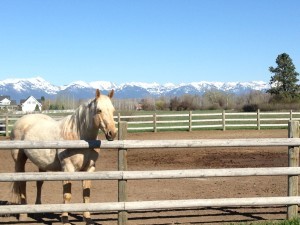
5) If you become so frightened driving with your teenager that you feel faint, slap yourself. Do it one more time for good measure and tell yourself to buck up and be brave.
6) During the driving lesson if you start to feel like you can’t breathe, it’s probably not a heart attack. It’s a panic attack. Keep a paper bag in the car, breathe deeply, and think about a love scene with your favorite Hollywood boyfriend with you in it. Do not ever tell your teenager you’re thinking about a love scene with Hollywood Boyfriend as this will totally, completely freak her out and she will smash that light post right in front of you and T – bone the car and you will have deserved it, Mom! Duh.
7) Absolutely do not let your kid drive on the freeway until they have driven and driven and driven some more on all other types of roads and highways unless you enjoy the feeling of your heart grinding to a stop, and believing that you are now going to die, die, OH LORD ALMIGHTY, you are going to die.
8) Teaching a kid to drive will make your hair whiter sooner. It just will. Accept it. You’re middle aged now anyhow, oh yes you are, yes you are, yes you so are.

9) When your child decides to hit the brakes in the middle of the highway, for no reason, and you shriek, “Go! Go! For God’s sakes, GO!” Be prepared for said teenager to later be in a huff because you, “Yelled at her for nothing!”
10) It is permissible to carry a rosary. Just remember that it is “Hail Mary,” and not “Hellllll, Mary! Hell!”
11) Do not slug down straight shots from your “coffee mug,” while teaching your child how to drive no matter how tempting. Not legal. Poor example.
12) This one is not about learning to drive, but I’ll add it: You are a fool if you buy your teenager a sports car. Truly. You are.
13) You will think of your parents teaching you to drive when you are teaching your kid how to drive. You will be sorry you were such a sulky and ridiculous teenager and you will know that your parents are now getting their revenge and cackling like weird, half crazed hyenas at your expense.
14) When the driving lesson is over for the day, compliment your teenager to build her confidence, then allow her to skip through the front door first. If you have wet your pants, you can then hobble in through the garage and make a dash for the bathroom.
Good luck. May the force be with you, fellow parent. There are many sacrifices in raising children, and this is one of them. I’m going to lay down now with a cool cloth over my head and envision my children driving very nice, slow horses named Sam.
May 7, 2016
Fighting With A Story Line, Wanting To Garden
I have 897 more words to write on this blasted book before I can go outside and garden and I swear I’m going to throw this blasted laptop if I cannot think of something quick to write and get this word count done for the week. Blast me, just do it. Ugh – wait for me, Petunias! Wait for me Wisteria vine! I’m coming!!

April 26, 2016
This Is A Blog About Health, Wealth, Happiness, and Sex
My nana, Mary Kathleen, was orphaned at the age of four in Texas.
Her mother died a few weeks after my nana’s brother was born, of what they then called “blood poisoning.”
My nana’s father decided it would be best if he took off into the wild blue yonder after his wife’s death, rarely to be seen again by his abandoned children.
Mary Kathleen and her brother were shuttled from relative to relative and never felt, according to my mother, wanted. Her brother, tragically, ended up an alcoholic.

My nana met my grandpa, Thomas Cecil, one of eleven kids, a poor farm boy from Arkansas, fell in love, and got married. They had a lot in common, not all of it happy. My grandpa also lost his mother when he was about four years old. His father, a farmer and sheriff, married three times and outlived all of his wives. The eleven kids were his, hers, and theirs. There was love in that house but not much money.
In his early twenties, my grandpa, who had an eighth grade farm education, left Arkansas and headed to Los Angeles with a few brothers to build homes. They needed work, they did not want to eke out a living on a farm like their father, yanking up crops from an unforgiving earth, and they heard there was money to be made in LA. My nana left with him and the trek began.
My grandpa loved his wife and his daughter, my mother, Bette Jean, and he loved his grandkids. But, as I understand it from my mother, Grandpa had mellowed out considerably by the time his grandkids came along.
When he was a home builder in California, he was a tough, rough man who was not afraid of a full blown fight and letting his temper run around and amok when someone pushed the wrong button, or when the lumber he needed or the electrical wiring that had to be installed had not arrived on his building site.
My mother remembers my grandpa sitting down for dinner with her and her mother, white lace tablecloth ironed, silverware shiny, a properly laid table, and then getting up to take, or make, phone calls for work. “Excuse me please, Mary Kathleen,” he would say to my nana, quite calmly, as he refolded and placed his white napkin on the table.
My grandpa would then yell into the phone, swear, threaten to knock heads together, then slam the phone back into its cradle when he was done. He would sit back down at the table, place his white napkin over his lap, look at my nana across her fine, white, lace tablecloth, and say, “Mary Kathleen, this dinner is delicious,” as polite as could be.
My nana would then continue the conversation as if her husband had not just gotten up and set the phone lines on fire with his temper.
Nana might have grown up poor, but she had gentle southern manners that never failed, no matter what the situation, even when her husband got up and cursed like the devil during dinner after they had said grace and thanked God for their bounty, through Christ our Lord, amen.
Nana was a polite steel magnolia.
But the steel magnolia had a favorite saying when it was someone’s birthday that might have been outside of that polite realm. She would happily add candles to the birthday cake, counting them off as they were squished into the icing: One candle for health, one for wealth, one for happiness, and one for sex.
As most of you know, the original birthday candle saying is “one for health, wealth, happiness, and success.”
Somehow my sweet nana had missed that part and thought the wish was not for success but for sex.
When I was a teenager I remember her counting off my birthday candles as she dropped them into my cake, “Here, dear. One for health, wealth, happiness, and sex.”
This wish for sex, especially coming from my gracious nana, was pretty darn funny. As a gawky teenager with looks only a mother could love, I could only hope that one day I would have sex with a handsome man but it seemed like a remote impossibility at the time.
That my Nana wished for it for me seemed like a good omen. Maybe it would happen one day!
When I light candles on birthday cakes, I often laugh and think of my nana. It was a difficult life she led in so many ways, but she always kept her elegance, her manners, her integrity, and truly wished everyone only the best – health, wealth, happiness, and sex.
Wishing you the same.
April 17, 2016
Journaling My Very Best Friend
I use at least four or five journals per novel.
Within the white pages I write and scribble, daydream and draw, make lists and plans and tell myself to quit whining and start writing.
I’ll write down random, jumpy thoughts and things that make me laugh.
I’ll sketch out characters and plots and subplots and the most ridiculous things.
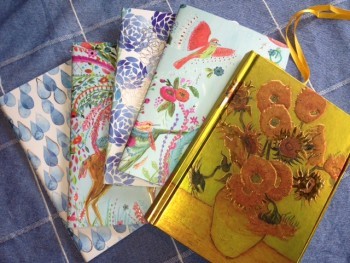
The more problems I’m having with a book, the more journals there are.
When I’m stuck in my writing and don’t know where to go, I journal.
When I’m grinding through a twisty scene that makes my cranium crazy or I don’t know how to make it funnier, sharper, more poignant or tearful, I journal.
When I don’t know who an elusive character is or if I should kill him off because he baffles me, I journal.
I’ll let my brain go and hope that something creative falls out of it that I can use in my book.
One thing I love doing is cutting out magazine/newspaper pictures that inspire me or relate to the plot I’m working on or are just flat out interesting.
These are a few photos from my first, of many, journals for my novel, My Very Best Friend. All the photos and pictures were inspiring in some way. Some ended up, in some form, in the book, others never did.
Happy reading, happy writing, happy day to you. And if you don’t journal, try it. You might like it.
April 13, 2016
Come Join Us On Saturday, April 16th
Writing a book? Do you like listening to authors talk and laugh about writing?
Come and join Karen Karbo, Ellen Urbani, Rene Denfeld and me as we talk about strong, flawed, wild, adorable, rebellious, opinionated, quiet, angry, smart, imperfect female characters at the book store, “Another Read Through,” in Portland, Oregon, this Saturday from 1:30 to 3:00. (Free, of course!)





